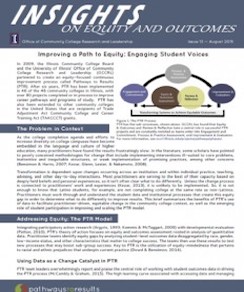OCCRL’s newest Insights on Equity and Outcomes brief, "Improving a Path to Equity: Engaging Student Voices," provides an overview of the emerging emphasis in the Pathways to Results (PTR) model on engaging student voices to facilitate practitioner-driven, equitable change in the community college context, as well as the role of student participation in scaling PTR.
PTR’s reliance on practitioners’ engagement with quantitative student-level data is a common feature of many data-driven improvement initiatives in higher education, including Achieving the Dream, Inc. and the Center for Urban Education’s Equity Scorecard; however, as OCCRL has sought to scale the PTR model, it has become obvious that engagement with quantitative data in itself may not always catalyze change. Without qualitative data to give a face and voice to the numbers, practitioners’ perceptions may not change.
This brief provides an overview of recently released resources in the Process and Practice Assessment module that engage students intentionally as informants and experts in their educational experience. When done well, including student voices in the body of collected data also shows promise for supporting stronger alignment between the root cause of outcomes inequities and the selected educational improvement.
This brief was authored by Heather McCambly and Dr. Debra Bragg, with the support of the Illinois Community College Board.
Heather McCambly, M.A., is the project coordinator for the Pathways to Results and Finish Up Illinois initiatives at the Office of Community College Research and Leadership. Her research has centered on the equity implications of performance based budgeting and funding systems, intersectional identity and student success, and equity-centered change on the community college campus.
